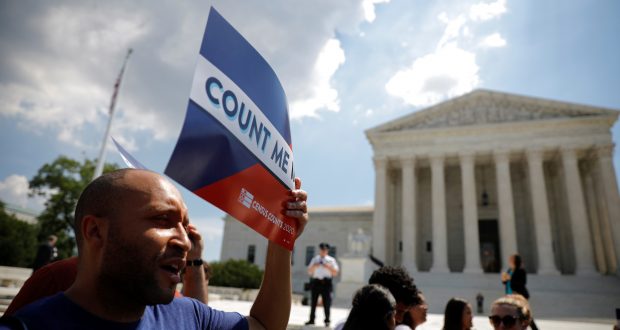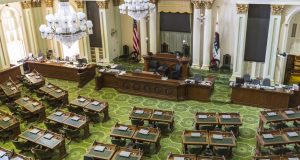By Charlene Muhammad | California Black Media
African-American leaders across the country – and around California – are pulling out all the stops this time. They say Blacks cannot afford to be undercounted in the US 2020 Census.
During the last census in 2010, field reps undercounted African Americans across the United States by more than an estimated 800,000 people.
The data census workers collect is used to determine how over $800 billion in federal, state and local money for programs like Medicaid, Head Start, WIC, SNAP, Community Block Grants, Title 1, and more, is distributed among communities throughout the nation. The federal government also uses that information to decide how many United States representatives each state is allotted in Congress.
“There are certain zip codes and certain populations that are hard to count,” said Cassandra Jennings, president and CEO of the Greater Sacramento Urban League. “Those groups include Blacks, Latinos, Asians, the youth, elderly and renters.”
Jennings also serves as a subcommittee chair for California’s Census 2020 Hard to Count Campaign, tasked with making sure there is full participation among Californians.
In Sacramento County where Jennings lives, she is working with 50 partners to develop culturally sensitive outreach methods for targeting Blacks. Trusted messengers in the community, Jennings says, like community based groups and African-American media, including Black-owned radio stations, newspapers and magazines, will help the Urban League get the word out.
Last month, African-American leaders around the country convened a ‘Tele-Townhall’ titled “Make Black Count.” Civil rights leaders, activists, journalists, members of the clergy and concerned citizens joined the conversation via teleconference to get a better sense of ways they can encourage people of African descent living in the United States to participate in the upcoming census.
The National Urban League (NUL), the National Association for the Advancement of Colored People (NAACP), the Lawyers Committee for Civil Rights Under Law (LCCR) and the National Coalition on Black Civic Participation (NCBCP) hosted the town hall, held on Oct. 22.
Stacey Abrams, who ran for governor of Georgia last November, joined Marc H. Morial, president of NUL, the Rev. Al Sharpton, president of NAN, and Melanie Campbell, president of NCBCP, among others, to lead the discussion.
“The Census is important because it is the foundation for all reapportionment – drawing of lines for council seats in cities, county commissions, juries, state legislatures, certainly for members of Congress, and in those communities which elect judges from districts, it also impacts that,” said Morial.
Morial challenged the ‘Tele-townhall’ participants to do all that they can to make sure everyone is fully counted and to hold the US Census Bureau accountable to conduct a full and complete count.
In California, African Americans, in large numbers, mainly live in about ten of the state’s 58 counties. In those regions, the majority of Blacks reside in tracts that the United States Census Bureau has designated hard to count, according to California Black Media’s “Counting Black California” report.
So, in Los Angeles, Alameda, San Bernardino and Sacramento counties, for example, local governments are funneling California census money to support the work Jennings and others are doing to mobilize participation among Blacks and other hard-to-count groups. So far, California has invested about $187.3 million into achieving an accurate account of state residents in the 2020 Census.
From March 20-22 next year, Sacramento County census outreach groups, for instance, will hold a “Black Count” public awareness weekend. It will feature a blitz of activities targeting more than 14,000 Blacks in the county, including “pop-ups” at approximately 20 churches in the capital city area to provide volunteer training. There will also be special programs aimed at getting the information to young people.
Similar efforts are being planned in counties across California.
To effectively reach African-American communities in California, Jennings said, census outreach workers will have to focus on educating people about why the census is important to them. They will also have to explain that every member of each household must be counted, including all children and grandchildren – even if they are not listed on the lease.
During the 2010 census, 10 percent of the estimated 4 million children in the United States that census workers did not count lived in California, according to the California Complete Count Office.
Last week, the California-Hawaii NAACP Conference announced a plan to sign up African Americans across California for census jobs. The effort called “Black Recruitment Week” will be led by the civil rights group’s local branches and will be held from Nov. 24-26. The state NAACP will announce the dates, times and locations of the hiring events on its website.
Special attention would have to be given to aging adults, too, Jennings said, because some of them are isolated from social networks and lack access to computers, smartphones, radios and even television.
For some African Americans, it’s a matter of trust, Jennings added. “It’s important for people to know their information won’t be ‘out there’ or compromised, and if they are concerned about information being reported to landlords, for instance, rest easy, it won’t.”
The U.S. constitution mandates the federal government to count every resident of the United States every 10 years. Next year’s census will officially kickoff in April.
“The way the count will work is: Beginning March 12, Census 2020 will mail a unique user ID to most U.S. households,” Morial told participants of the ‘Tele-townhall.’ “This will allow heads of households to complete the form online, or by mail, or by phone, ahead of Census Day, which is April ,1 2020.
 Westside Story Newspaper – Online The News of The Empire – Sharing the Quest for Excellence
Westside Story Newspaper – Online The News of The Empire – Sharing the Quest for Excellence




